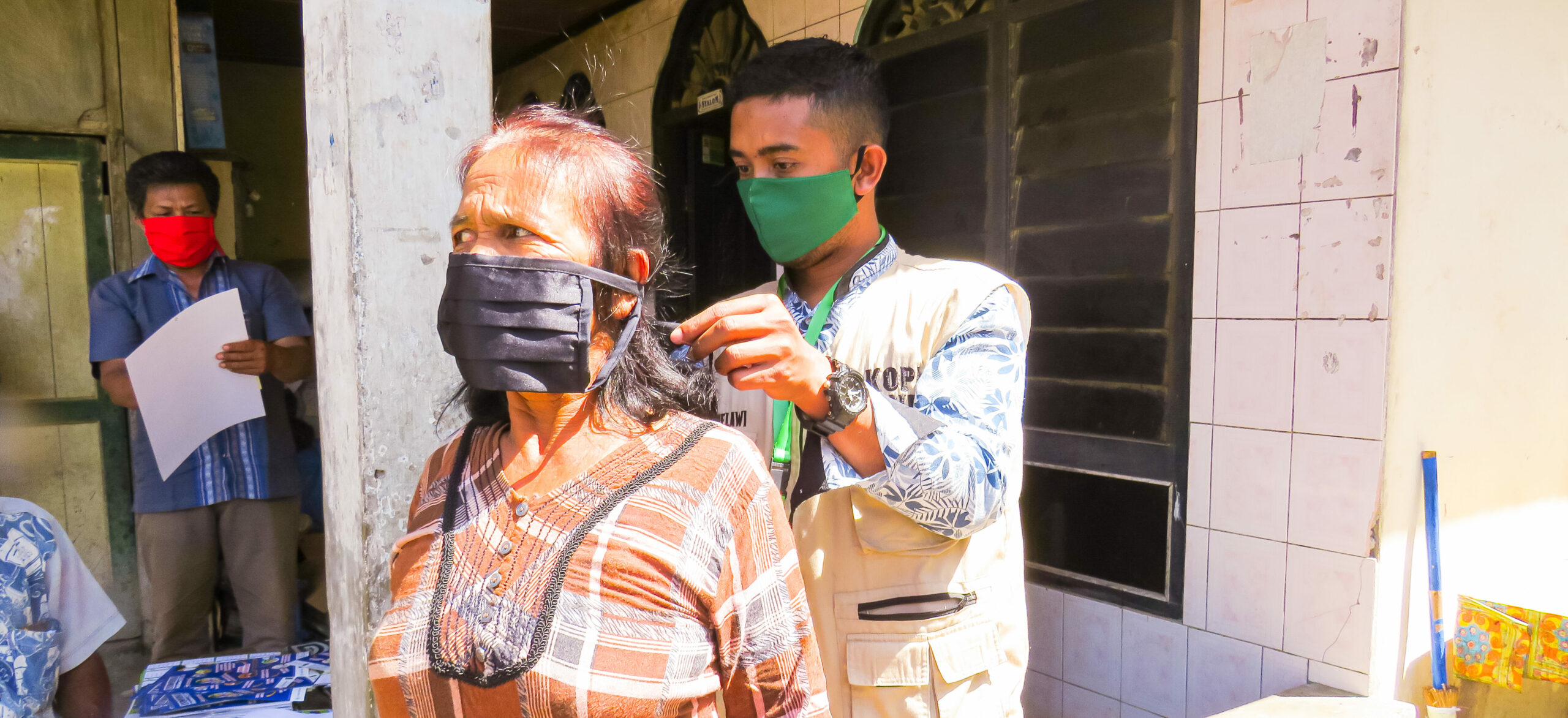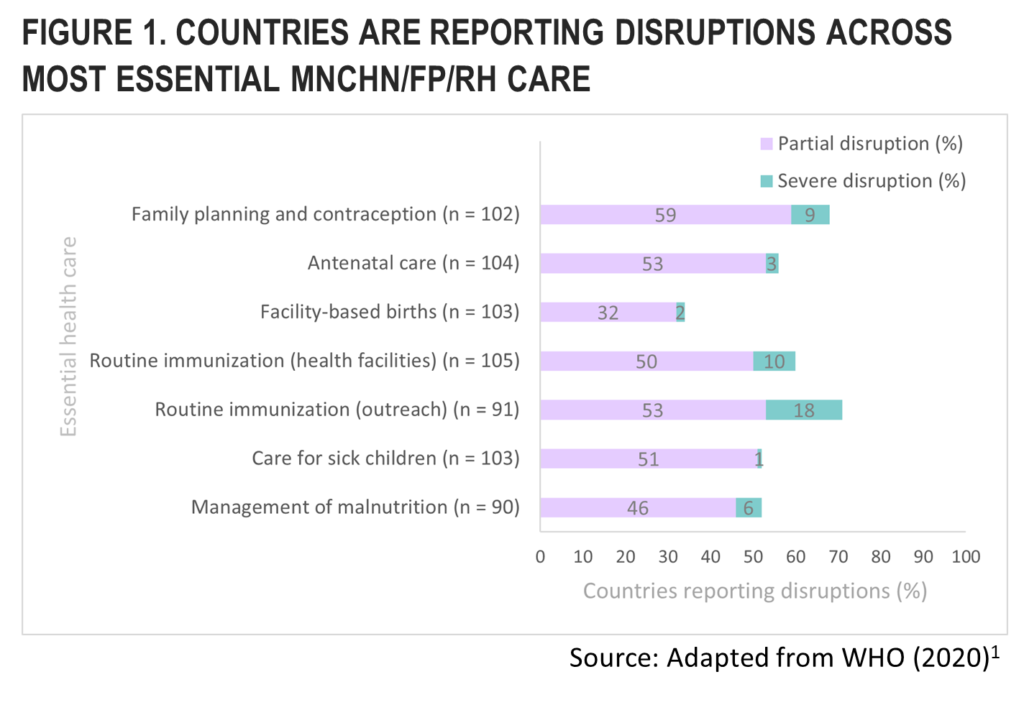Disrupted Health Services during COVID-19: How Do We Address It?
Published on January 4, 2021

Global pandemics can be catastrophic events for a country’s entire population and place an enormous strain on existing health care systems. The COVID-19 pandemic has tested the resilience of health systems worldwide, including in some lower- and middle-income countries, which already struggle with delivering essential, quality health services for women and children.
As of July 2020, out of 105 countries, over half reported partial or severe disruptions in essential health services, including maternal, newborn, and child health, nutrition, and voluntary family planning care, according to the WHO Pulse Survey 2020.1
Causes of the disruptions are a mix of demand and supply factors such as declining use of health services by people worried about getting infected, lockdowns, transportation problems, medical supply chain disruptions, health facility closures, and shrinking financial resources. To prevent large-scale harm, we must act fast.
MOMENTUM is poised to assist partner countries in addressing health system obstacles and ensuring lifesaving care continues to improve maternal, newborn, and child health and nutrition services, voluntary family planning, and reproductive health (MNCHN/FP/RH) care. That means gathering evidence to understand the effects of the pandemic and identifying gaps in access and care.
What We’ve Learned So Far
Experience from previous disease outbreaks has taught us that global outbreaks can push health systems to the brink. For example, one of the indirect effects of the 2014 Ebola epidemic was the drop in access to care for mothers and children, increasing their risk of injury or death.2
During the fall of 2020, MOMENTUM quickly reviewed the challenges faced by communities and health systems and the solutions implemented to respond to drops in equitable and quality MNCH/FP/RH care during the COVID-19 pandemic.3 Data from most countries reported disruptions across essential MNCH/FP/RH care. The Global Financing Facility for Women, Children and Adolescents (GFF), which monitored the pandemic’s effects in certain countries, confirmed these findings and found substantial disruptions in outpatient visits and vaccinations for young children, care for pregnant women and new mothers, and safe deliveries by skilled health workers.4
These disruptions have resulted in increased health care costs, decreases in quality of care, and limited data monitoring and reporting in some countries. The number of health workers also dropped as a result of COVID-19 infections and deaths or got reassigned to support the COVID-19 response. Some countries reported a rise in depression among pregnant women and mothers, and an increase in stillbirths, gender-based violence, and food insecurity.4
Facing Health Obstacles Head On
To absorb the shock of health emergencies and outbreaks, we must build responsive and resilient health systems.

MOMENTUM is working on tackling such challenges by collaborating with countries’ public health leaders, health and non-health stakeholders, and technical experts to immediately respond to the crisis while simultaneously strengthening health systems to build resilience to future shocks.
We are currently supporting countries, communities, and decisionmakers to use existing and new data and skills to make informed decisions. MOMENTUM partners recently participated in developing guidance for monitoring the effects of COVID-19 on essential services for reproductive, maternal, newborn, child and adolescent health and nutrition, a supplement to the WHO Maintaining Essential Health Services Guide. The joint collaboration included UNICEF, UNFPA, WHO, and other academic and non-government organizations from around the world. The guidance uses routine health information system indicators to monitor the specific, potential impact of COVID-19 on essential health services.
In the coming months, MOMENTUM will be working with countries to help them respond to COVID-19. We’ll share lessons learned across countries to help guide their response to the pandemic and ensure that mothers, newborns, and children continue to get the quality health care they deserve.
References
- World Health Organization. Pulse survey on continuity of essential health services during the COVID-19 pandemic. Interim Report. August 27, 2020. https://www.who.int/publications/i/item/WHO-2019-nCoV-EHS_continuity-survey-2020.1
- Shannon, F.Q., E. Horace-Kwemi, R. Najjemba, P. Owiti, J. Edwards, K. Shringarpure, P. Bhat, F.N. Kateh. 2017. “Effects of the 2014 Ebola Outbreak on Antenatal Care and Delivery Outcomes in Liberia: a nationwide analysis.” PHA 2017 7(S1): S88-S93. https://www.ncbi.nlm.nih.gov/pmc/articles/PMC5515570/
- Ivankovich, Megan, Emily Stammer, Lisa Hirschhorn, Sohini Mukherjee, Caddi Golia, Katherine Semrau, Lara Vaz. 2020. Effects of COVID-19 on Essential MNCHN/FP/RH Services and the Strategies and Adaptations Emerging in Response. MOMENTUM Knowledge Accelerator Presentation. November 2020. https://usaidmomentum.org/resource/effects-of-covid-19-on-essential-mnchn-fp-rh-and-the-strategies-and-adaptations-emerging-in-response-rapid-evidence-summary/
- Global Financing Facility. New findings confirm global disruptions in essential health services for women and children from COVID-19. Press Release. September 18, 2020. https://www.globalfinancingfacility.org/new-findings-confirm-global-disruptions-essential-health-services-women-and-children-covid-19.
COVID-19
To fight the COVID-19 pandemic, we're ensuring the continuity of lifesaving health care, strengthening resilience, and sharing best practices so that women, children, and their communities continue to receive the care they deserve during this crisis.

